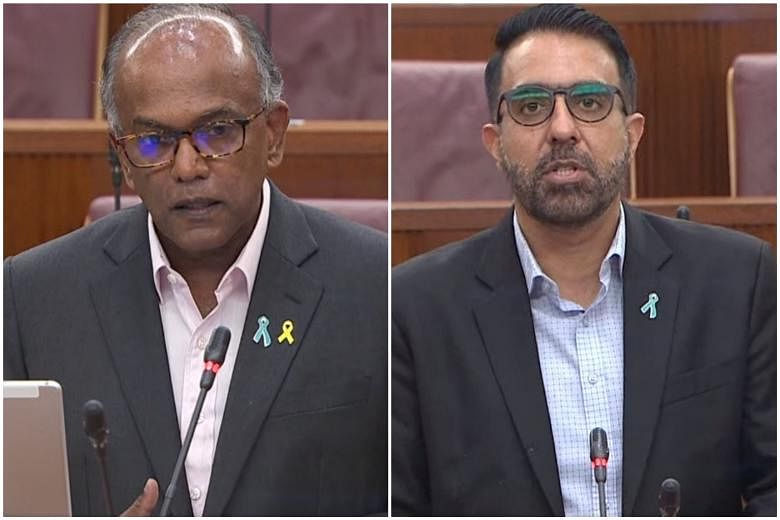SINGAPORE - The Cabinet, top civil servants and public service as a whole do not make policy decisions that favour their religious groups, said Home Affairs Minister K. Shanmugam on Monday (March 1).
Responding to Leader of the Opposition Pritam Singh, who had broached the possibility of religious bias in top civil servants either now or in the future, Mr Shanmugam stressed that neutrality and fairness are essential, otherwise the Government will lose the trust of the people quickly.
If there is evidence of such a lack of integrity among current senior civil servants, that should be stated and dealt with, he added.
Mr Singh (Aljunied GRC) had cited the recent example of the 16-year-old Christian youth who planned terror attacks against two mosques in making the point that Singaporeans may need reassurance that government policy is strictly secular, and neither favours nor is influenced by religious beliefs from any quarter.
The Workers' Party chief also asked about the risk of government policy being subtly influenced by religious people who are not necessarily radical.
"Is there a danger in Singapore that laws and policies could be tilted towards particular religious beliefs - for example, because of the dominant religious beliefs of senior civil servants or people of influence? If not now, maybe some time in the future?" Mr Singh said.
In response, Mr Shanmugam said the principles of secularity and neutrality between religions have been one of the "golden threads" in Singapore's policymaking, and is a key reason the country is where it is now.
He cautioned that Mr Singh's statement could be misread as saying that top civil servants could be biased, and could act in favour of religious communities because of their own religious beliefs, both now and in the future.
Leaving the public with that impression about current top civil servants would be seriously wrong, he said.
"If the statement was meant only to cover a future possibility, without any hint or suggestion of a lack of integrity among current top civil servants, then that should have been made crystal clear."
He added that Singapore's current top civil servants have dedicated their entire lives to public service loyally and faithfully.
Mr Shanmugam acknowledged that "not everyone is, or can be expected to be a saint", noting that individuals can sometimes have a tendency to see things through a religious lens or a personal perspective.
That can apply to everyone, from ministers to ground officers, he said, stressing that Singapore has to "jealously guard" against any such tendency and be strict about its secular approach.
He noted that Mr Singh had been reflecting what some segments of society may feel, but underlined that this is not a systemic issue.
The safeguard against this becoming an issue starts with politics, he said, adding that both sides of the House bear this responsibility.
"(If) you want an example of where it can lead to, look at the United States, how votes are sought along religious lines," Mr Shanmugam added. "We go down that road, we will be in trouble."
Mr Singh later clarified that he was not suggesting that some civil servants are biased and had no intention of undermining their work and morale.
"My motivation was to really seek a restatement of the Government's commitment towards secularism," he said.
On the LGBT community
Mr Singh had also raised concerns over discrimination against the lesbian, gay, bisexual and transgender (LGBT) community, citing an incident in which a man had thrown a pride flag at an eatery's staff members and hurled abuse at them.
Mr Shanmugam reiterated that everyone in Singapore will be protected and treated equally, no matter their beliefs, pointing out that under the Maintenance of Religious Harmony Act, action can be taken against religious groups that, using religion, attack non-religious groups. This includes the LGBT community, he said.
"Regardless of which community - what your social, religious or sexual beliefs are - everyone will be protected here, and I have said so categorically," he said. "We are all equal. We are not any lesser by reason of our sexual preferences."
Action will be taken against those who stir hate speech against any sexual or religious community, he said.
However, this does not mean action will be taken on every occasion, he said, adding that police will assess the situation and use their discretion.
Responding to Mr Shanmugam's remarks that every community is equal regardless of its sexual orientation, Mr Singh said: "I completely agree with this, I support this. I think it's a very powerful statement, a fair and egalitarian approach to dealing with the matter.
"I hope all Singaporeans, regardless of race or religion, actually coalesce around this, and have reasoned and respectful conversations on LGBTQ issues. And I think we'll be stronger as a nation for it," he said.
Proposed White Paper on communal harmony
On Mr Singh's proposal to have a new White Paper on communal harmony, the minister said the Government does not rule out such a move.
Mr Singh had mooted the paper to safeguard Singapore's multi-religious nature and deal with far-right extremism.
Mr Shanmguam noted that the Government had published a White Paper in December 1989 on religious harmony, which spelt out how religion and politics must be kept separate, and how religious followers must exercise moderation and tolerance.
It later resulted in the Maintenance of Religious Harmony Act, which was amended in 2019 to fine-tune Singapore's laws against hate speech.
Besides changes to the law, Singapore has also been engaging the public and working with the religious community on ways to promote interfaith harmony as well, the minister said.
While there are moderate to very high levels of racial and religious harmony here, the Government does not take this for granted and will continue efforts to enhance relations, he added.
"We will remain watchful of trends and consider doing so if and when necessary," he said of Mr Singh's suggestion.


